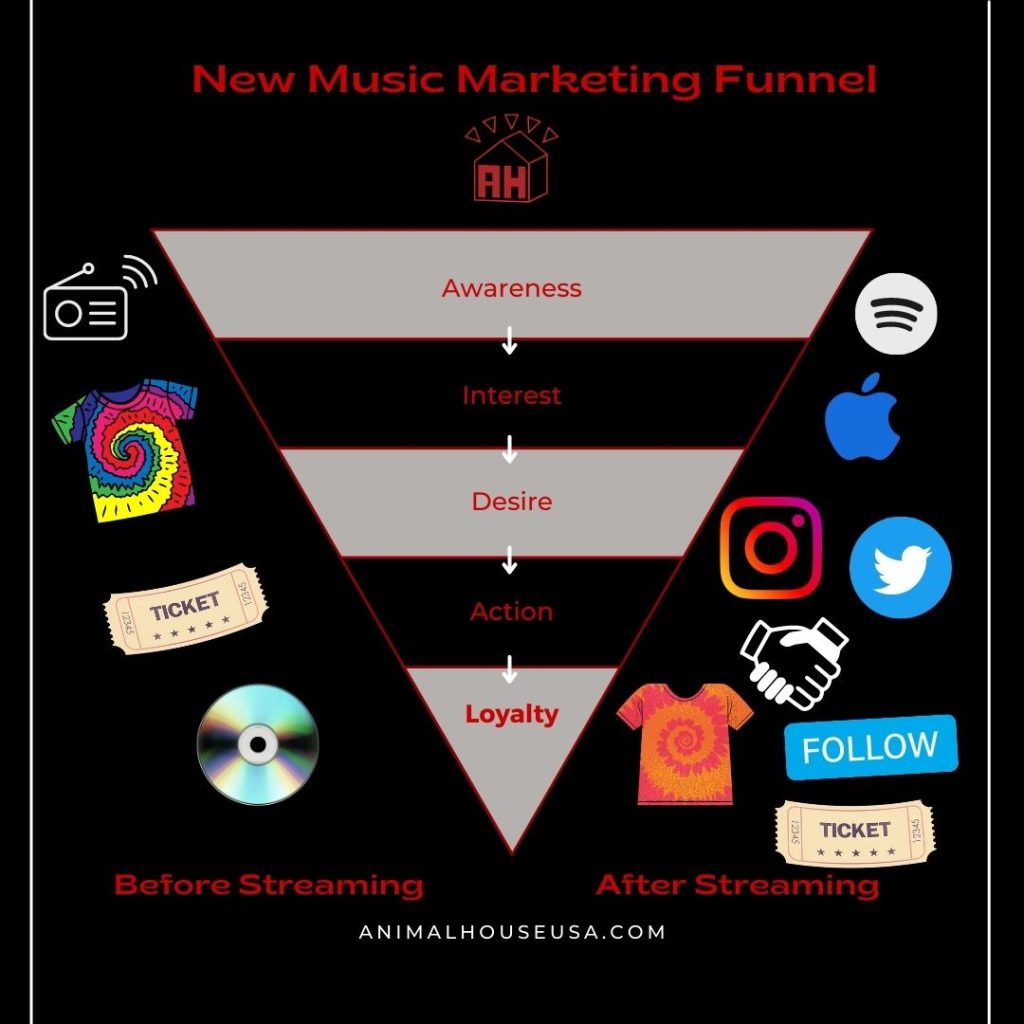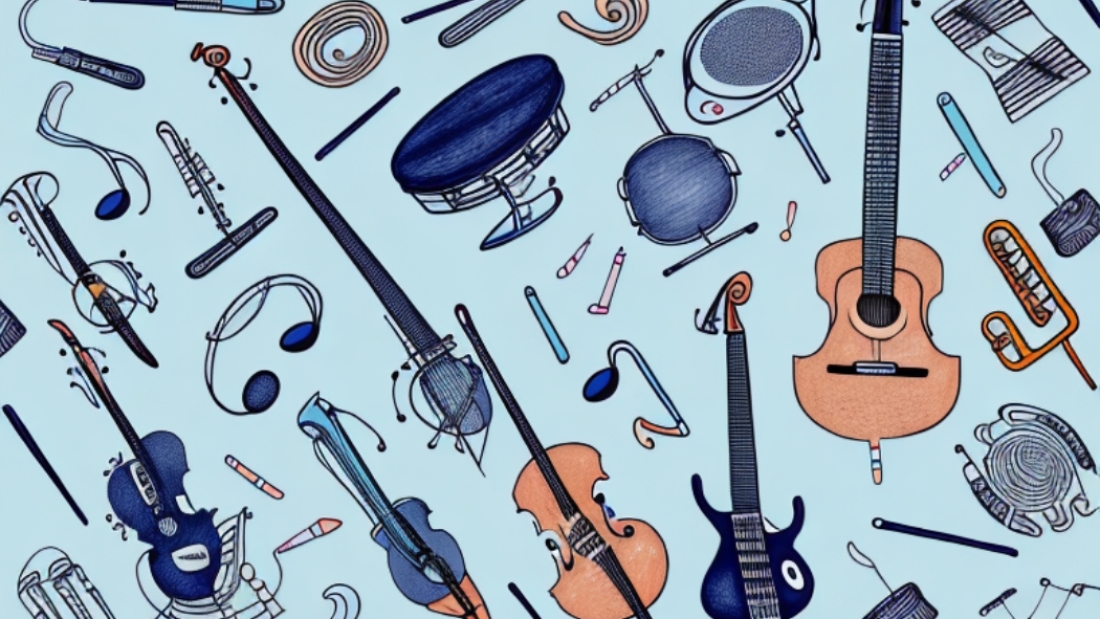In today’s digitized and ever-evolving world, musicians are finding innovative ways to leverage their craft beyond just concert performances and album sales. With the advent of digitalization and the rise of social media platforms, the music industry has witnessed a significant shift in how artists communicate with their audience. This shift has given rise to the emergence of music as a powerful marketing tool, with the hopes of leading the consumer down the path of conversion for another product.
We want to explore the evolution of music as a marketing channel, delve into the artistry behind music as a communication channel, examine case studies of successful product promotions through music, analyze the pros and cons of music-driven marketing, and discuss the future of music in advertising campaigns.
Understanding the Shift in Music Industry
It has been noted by many that the music industry has undergone a remarkable transformation in recent years. With the rapid advancements in technology and the widespread availability of online platforms, musicians are no longer solely dependent on record labels and traditional media outlets for exposure. The digitization of music has significantly leveled the playing field, allowing artists to independently distribute their music and connect directly with their fan base.
Furthermore, the rise of streaming services, such as Spotify and Apple Music, has revolutionized how consumers access music. This shift from physical sales to digital streaming has forced musicians to explore alternative revenue streams. One such stream is leveraging music as a communication channel rather than it being the center focused product.
The Evolution of Music as a Marketing Tool
Music has always had the power to evoke emotions and create deep connections with its listeners. Recognizing this, marketers have increasingly turned to music as a means of engaging consumers and promoting their products whether their own or strategic partnerships. By incorporating music into advertising campaigns, brands can tap into the emotional dimension of their target audience and create lasting impressions.
From jingles in radio commercials to carefully curated soundtracks in television ads, the use of music in marketing has transcended traditional boundaries. I mean all last year you had half the world singing Burger King’s “Whopper Whopper” jingle. Sales increased. It’s not like the product changed, only the messaging.
Musicians, too, have embraced the opportunity to collaborate with brands, aligning their music and image with the products they endorse. This synergy allows artists to reach a wider audience and to leverage their music as an exchange for a conversion of a product. They must find a way get creative when it comes to revenue streams.
Travis Scott WILL take advantage of Billboards new bundle rules with “UTOPIA”… there will be 5 separate CD’s & Vinyls all with different covers available on release. Each counting as an individual sale 😳💿
Could Travis Scott be ready to push 1 MILLION first week… pic.twitter.com/18KY059rUd
— Hip Hop All Day (@HipHopAllDayy) July 9, 2023
Travis Scott x Air Jordan 1 Low “Utopia” 🔥🌵 pic.twitter.com/57xbpmNv84
— KicksFinder (@KicksFinder) July 10, 2023
The Psychology Behind Music and Consumer Behavior
Studies have shown that the use of specific genres of music can influence consumer behavior. For instance, energetic and upbeat music can create a sense of optimism and motivate consumers to take action.
On the other hand, soothing and calming melodies can cultivate a sense of relaxation and encourage brand loyalty. So take note of these things next time you are being marketed to. Try to think about their end goal there.
Additionally, catchy jingles and earworms can stay in consumers’ minds long after exposure to an advertisement, increasing brand recall and top-of-mind awareness. Therefore, the careful selection and integration of music in marketing campaigns can greatly impact consumers’ attitudes, purchase intentions, or the result of their tours. If you want a masterclass on a rollout for a specific album marketing campaign, go look at Metro Boomin. A #1 album and a part in the latest Spider-Man animated movie. Killing it.
Case Studies of Musicians Selling Products Through Music
The integration of product placements in music videos has become an established marketing practice. Musicians often collaborate with brands to showcase their products in their music videos, effectively merging the worlds of music and advertising. This seamless integration enhances the visual appeal of the video and allows artists to promote products to their extensive fan base.
Additionally, many musicians have ventured into entrepreneurship by launching their own product lines. From clothing and accessories to cosmetics and fragrances, these artists leverage their fan base and personal brand to promote and sell their merchandise. This direct-to-consumer approach is essential as we are only creates additional revenue streams, strengthens the connection between the artist and their fans but also evens the playing field for any up and coming artist.
https://www.youtube.com/watch?v=nuQ_bnwH6Swhttps://www.youtube.com/watch?v=Mh9fpWAPkZE
Successful Product Placements in Music Videos
One notable example of successful product placement in music videos is the collaboration between Rihanna and the luxury fashion brand Dior. In the music video for her hit song, “Secrets,” Rihanna seamlessly intertwines Dior’s iconic “Diorama” handbag throughout the video, showcasing the brand’s elegance and sophistication to her millions of viewers, leading to millions and millions in sales.
Another example is the partnership between DJ Khaled and beverage brand Ciroc. In his music video for the song “I’m the One,” DJ Khaled prominently features Ciroc bottles, effectively integrating the brand into the visual narrative. 10 years ago – they made a huge push in the liquor industry and now more and more liquors are being back by celebrity business.
Musicians Who Have Launched Their Own Product Lines
Musicians such Jay-Z, Kanye West and Rihanna have successfully translated their creative prowess into the realm of fashion. Kanye West’s Yeezy brand has gained international recognition and popularity, with his sneakers becoming sought-after fashion statements. Similarly, Rihanna’s Fenty Beauty cosmetics line has received critical acclaim and commercial success, offering fans products that align with her personal brand and style.
By leveraging their musical success and personal brand image, these artists have been able to build highly successful product lines that resonate with their fan base. This demonstrates the power of music as a communication channel but once their money is made, you can see why making music is not part of their daily lives anymore.
The Pros and Cons of Using Music for Product Promotion
While music-driven marketing offers numerous advantages, there are also considerations and potential drawbacks that should be taken into account.
Potential Drawbacks and Ethical Considerations
While music can be a powerful tool for advertising, there are several ethical considerations that marketers and musicians should be mindful of. Authenticity is paramount in connecting with consumers, and misalignments between an artist’s personal brand and the promoted products can erode trust and credibility. You see how fast a brand can get canceled. Just as we talked about Yeezy before, you all remember what happened earlier this year.
Additionally, the use of music in advertising should not overshadow the artistic integrity of the artist or undermine the integrity of their music. Balancing commercial interests with artistic expression is crucial. I could not stop laughing seeing Migos at the Nickelodeons Kid’s Choice awards after talking about gang banging in Atlanta. Only another piece that proves we are indeed living in a simulation.
The Future of Music as a Marketing Channel
As technology continues to advance and consumer preferences evolve, the future of music as a marketing channel is both promising and evolving. Emerging trends indicate that music will continue to play an integral role in advertising campaigns, captivating audiences and creating meaningful connections between brands and consumers.
One trend to watch is the rise of personalized music experiences. With the advent of artificial intelligence and machine learning, brands can create tailored music experiences by analyzing consumer data and preferences. This personalized approach elevates the impact of music-driven marketing, making it more relevant and engaging for individual consumers.
Emerging Trends in Music Marketing
Another emerging trend is the integration of augmented reality (AR) and virtual reality (VR) technologies in music marketing. By immersing consumers in virtual concert experiences or allowing them to interact with music-related products in virtual environments, brands can create unique and memorable experiences that drive product sales. They tried this with NFT’s but I think that was poor implementation of technology. Something we as a group will explore later on.
As streaming platforms continue to dominate the music industry, innovative collaborations between musicians and brands are likely to increase. From exclusive album releases to virtual merchandise pop-ups, these collaborations generate excitement and anticipation among consumers, transforming music consumption into a holistic brand experience.
Predictions for the Role of Music in Future Advertising Campaigns
Looking ahead, music is poised to become an even more integral part of advertising campaigns. The power of music to evoke emotions, create connections, and transcend cultural barriers will continue to make it a valuable tool in capturing the attention and loyalty of consumers.
When platforms refine their algorithms and recommendation systems, brands will have increased opportunities to target their audience based on musical preferences and behavior. This tailored approach ensures that the right message reaches the right audience within their niche, amplifying the impact of music-driven marketing campaigns.
What’s Next
As the music industry continues to evolve and adapt to digitalization, musicians are using music as a communication channel to sell products.
Through strategic collaborations, product placements in music videos, and the launch of their own merchandise lines, artists are leveraging their creative platforms to connect with their fans on a deeper level. The use of music as a marketing tool offers numerous benefits, including creating emotional connections, enhancing brand recall, and transcending language barriers. However, marketers and musicians must tread carefully, ensuring authenticity and safeguarding artistic integrity.
The future of music as a marketing channel is bright, with emerging trends such as personalized music experiences and augmented reality poised to redefine how music is utilized in advertising campaigns. As music continues to captivate audiences and create meaningful connections, brands will increasingly turn to music as a powerful communication channel to successfully promote and sell their products.




Leave A Comment